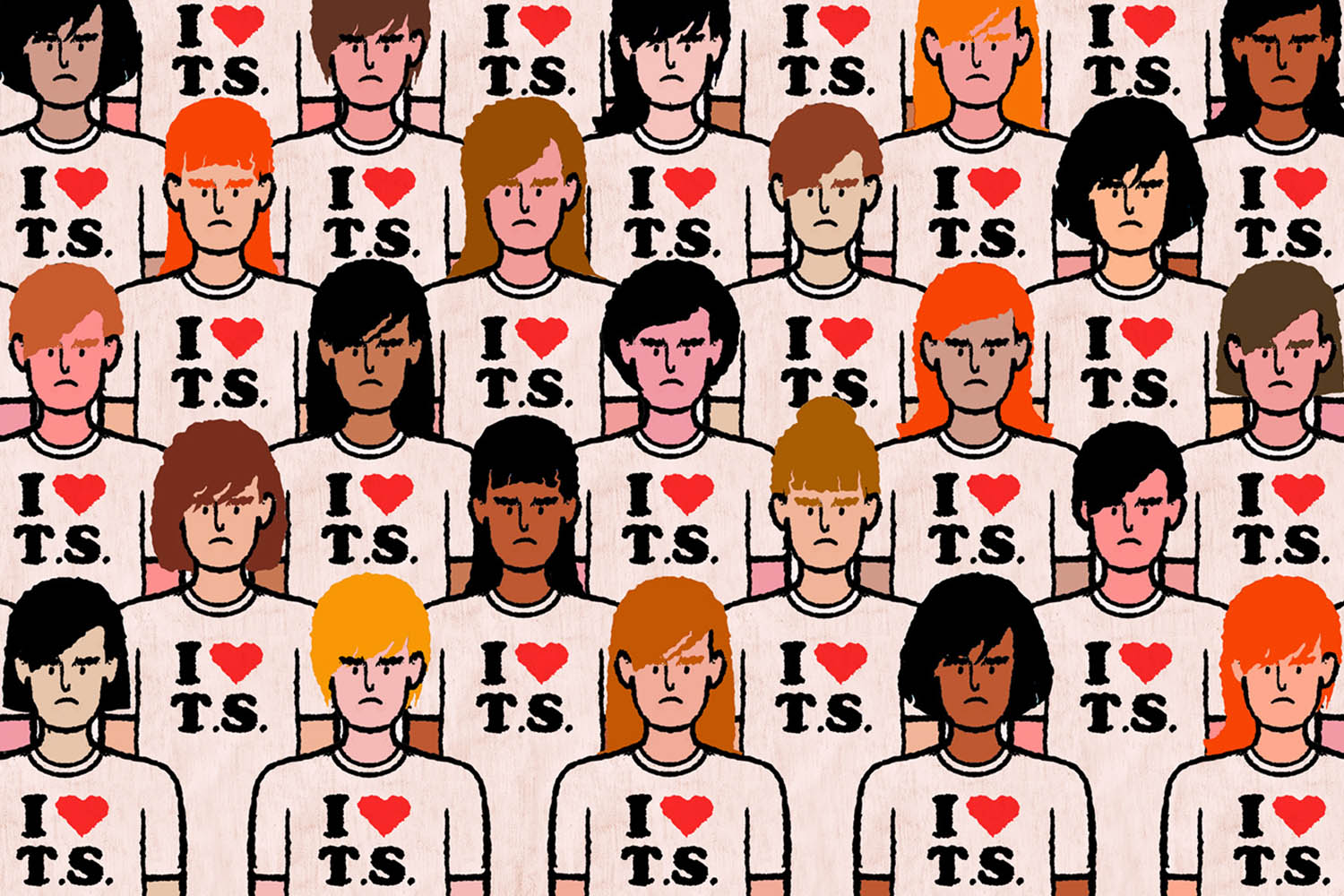Illustration by David Foldvari
I am a deeply jealous person. Mea culpa! At least I can admit this. I hate it when I love someone but they love someone else more than me. Which is really unfortunate for me, because I am a millennial woman and so, inevitably, all of my female friends love Taylor Swift more than they will ever love me.
Actually, I could cast the net wider, if I wanted to really hurt my own feelings: most millennial women love Taylor Swift more than they could ever love me. Or you. Some millennial women love Taylor Swift more than anyone they actually know in real life. For a certain type of person, loving Taylor Swift is like worshipping a deity. It’s not music; it’s religion. It’s Swiftism. Orthodox Swifties would burn apostates at the stake or flog themselves to ribbons if you told them that by doing so an angel would appear in a dream and reveal to them the lyrics from her next album.
As a feminist, I obviously believe that women should be allowed to do whatever mad thing they want. And yet as a sane person, I find Swifties terrifying. Their power is greater than any of us can possibly conceptualise.
There’s no greater example of the sheer extent of their axis of influence than the reaction to Swift’s engagement to NFL player Travis Kelce, which was announced late last month. Within days, the Ralph Lauren dress she wore in posed photos taken in a Hunger Games-esque garden of roses was sold out worldwide. The post itself, in which Swift describes the event as your English teacher marrying your gym teacher, has more than 36 million likes, making it one of the most popular Instagram posts ever. (The most popular is of Lionel Messi celebrating Argentina’s 2022 World Cup win, which, in many ways, embodies the straight millennial male equivalent of parasocial obsession that Swift inspires in straight millennial women.)
Newsletters
Choose the newsletters you want to receive
View more
For information about how The Observer protects your data, read our Privacy Policy
In the aftermath of the Swift-Kelce nuptial announcement, Swifties went into absolute meltdown. Several self-confessed “gaylors” – a subsection of the fandom who believe Swift is a closeted lesbian – posted on Reddit describing sobbing breakdowns that required them to seek support from their therapists. The more mainstream Swifties penned poems in honour of her big event. One, posted on Instagram, reads: “The day / Taylor Swift / got engaged / little girls screamed / grown women cried / and the awkward child / we all carry inside / finally felt / chosen.”
Look, I know, social media has made us all feel closer than ever to our favourite celebrities, but even by the cosy standards of modern day fame, isn’t this a bit much? Obviously, engagements are fun and exciting, but nonetheless, I don’t think they should provoke the same level of hysteria as the death of Princess Diana, or the birth of your first child, or an announcement that in 12 hours the planet will blow up and the world as we know it will end.
Logically speaking, We all know and understand that Swift’s level of fame is too stratospheric to warrant this level of personal investment in her relationships. Yes, she has some great songs, and her tours have become economic events that bring millions to local economies. Her choices, from concert location to dress style, have real-world effects on us all. Athos Salomé, a psychic from Brazil known as “the living Nostradamus”, says that, post-Tay engagement, the planet will never be the same.
“My view is clear: this event could have more economic impact than Taylor’s album itself,” Salomé told the Daily Mail. “For the first time, we will see a marriage not only as an intimate celebration, but as a cultural product consumed worldwide, comparable to a film or a tour.”
I get it. Taylor Swift is a bonafide pop superstar and an economic event all in one. But Taylor Swift is not your friend. Nor is she your English teacher, or your long-suffering, unlucky-in-love daughter, sister or mother. Her savvy controversy-free public persona, which leans towards the everywoman, means that we can project anything we want onto her. It doesn’t mean we should.
Some millennial women love Taylor Swift more than anyone they know in real life
Some millennial women love Taylor Swift more than anyone they know in real life
But even saying this feels uncomfortable for me. It feels a little like blasphemy, like soon I will be burnt to death on the Swifty altar and become some sort of posthumous Joan of Arc for pick-me girls. Because Swifties, like all evangelical fundamentalists, are not just feverishly passionate in love and worship. Their vengeance is, well, swift, and they show no mercy for heretics. Last week, a writer who joked on X about how ugly Taylor Swift’s wedding dress could be found their novel had been spammed with thousands of one-star reviews from Tay’s fans, months before the title has even been released. In response, the book’s publishers had to remove it from review websites.
Last week, when I told a friend, who’s also a writer, that I was thinking about writing about Taylor Swift, she had some good but ominously succinct advice for me: “Don’t.” It’s just not worth it, she says. Swift, she suggested, creates a whirlpool around herself; you either go along with it or swim against the current and find yourself washed up on an island somewhere, forced to starve to death in punishment for your sin.
I can admit it, this rattled me. I’m rattled enough to issue a plea to the Swifties. If you’re reading this, spare me. I am but a simple woman. I have many Taylor Swift songs on my Spotify. I am easily confused by many things, including having enough strength of feeling for a person you have never met that their engagement would make you cry, or write poetry, or consider buying a Ralph Lauren midi-dress. Perhaps this just means I am stupid. Mainly, I am just jealous. I don’t think I’ve ever felt as strongly about anything as Taylor Swift fans feel about her (and I say this as someone who owns a disturbing amount of Princess Diana memorabilia). I admire the strength of your faith. And I hope you love people in your real life as much as you love your English teacher.

